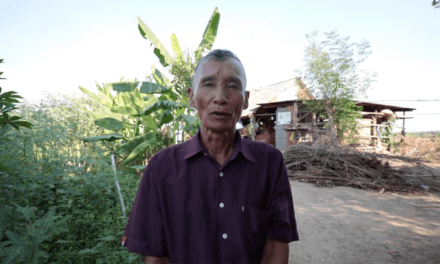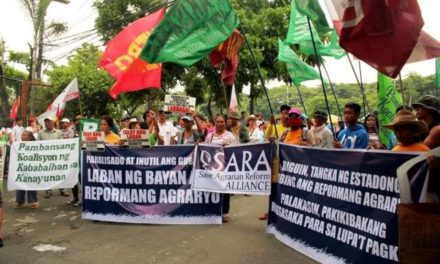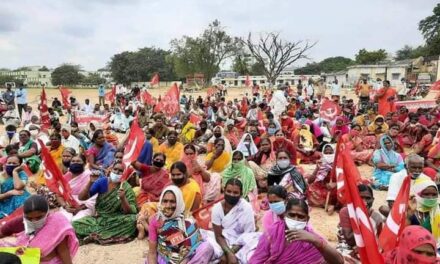Interview by Ros Sokunthy
The communes of Trapeang Chan and Pich Chongva are home to a vibrant community of people, including young and old, girls, and boys. On March 8th, International Women’s Day, they all embarked on a journey to participate in the event in Krapom Chhuck pagoda, utilizing a diverse range of transportation options such as motorbikes, bicycles, and hand tractors. The community shared the history of International Women’s Day; this year’s theme was “Empowering Girls and Women for Equality, Stability, and Social Justice,” shedding light on pressing challenges such as agriculture, the market, debt, and gender violence.
Falling Prices, Falling Support
Ms. Penh Art, a farmer and one of the women who led the local International Women’s Day event, is also a member of the Anchanrong Samaythmei Cooperative, based in Kampong Chhnang province. She said:
“The current economic system falls under the responsibility and management of the government. If the government establishes clear policies to regulate market prices fairly, farmers would not struggle to sustain their livelihoods.
Initially, the government promotes local rice production, but when widespread cultivation leads to an oversupply with no buyers, farmers are left with no choice but to stop growing it. .
Response without reach
From Penh Art opinion: “This is the kind of leadership community experiences. It is not enough to simply encourage the cultivation of local rice varieties like Sragne and Kravan if there is no guaranteed market for them at harvest time. In our community, when we attempt to grow imported rice, we cannot sell it at competitive local prices, especially this year. Authorities often claim that if farmers cannot sell their crops, they should stop growing them, implying that people will somehow manage—but that is not the solution we want. Everyone knew that the price of rice last time was 730 riels per kilogram. If we could not sell it, we were forced to dry around 70 to 80 sacks of rice”.
At the end of 2024, the Ministry of Agriculture set a minimum rice price of 1,000 riels per kilogram, instructing farmers to report any lower prices to the ministry via online platform
However, when she called for assistance, no one responded—they remained silent. Meanwhile, the community frequently hears officials boasting about Cambodia’s increasing rice exports, with promises that by 2030, the country will no longer face poverty. But for her, that vision does not seem realistic.
Rather than offering real solutions, they pushed farmers toward modern agricultural methods, claiming these would address their challenges. Under this system, farmers only needed land and the ability to maintain it, while companies or buyers, in coordination with the ministry and agricultural departments, provided fertilizers, pesticides, and seeds. However, the arrangement required farmers to share 50% of their returns.
She said: “In my case, my community and I chose not to follow this system. Instead, we managed our farms independently, ensuring at the very least that there was enough food to sustain our families.”
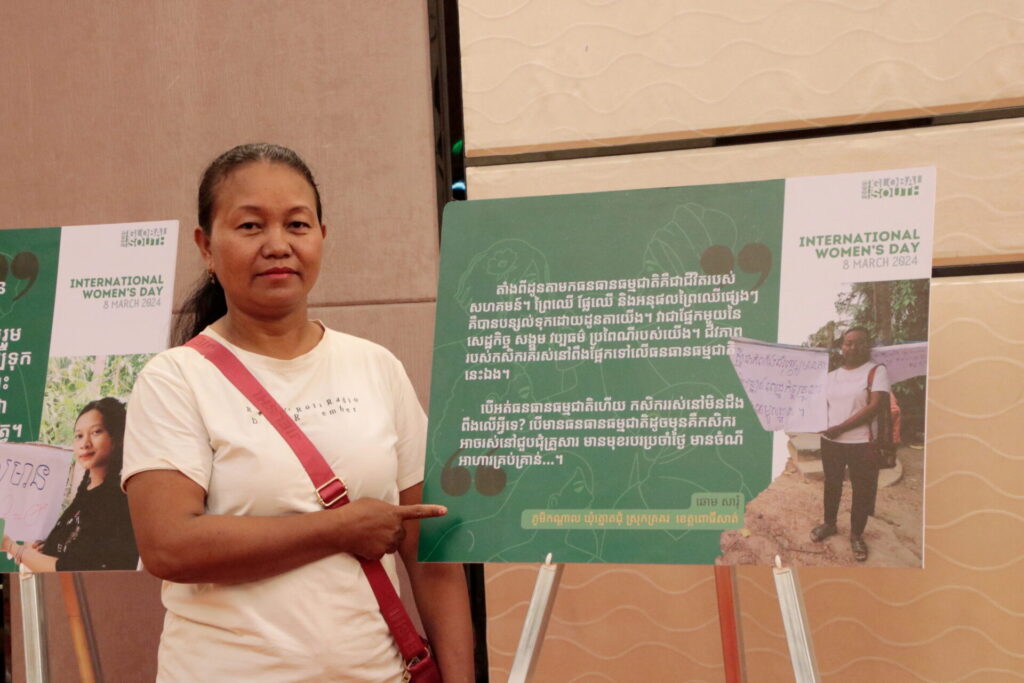 Mrs. Chaom Saroum – Kandal Village, Thnort Chum Commune, Krakor District, Pursat Province
Mrs. Chaom Saroum – Kandal Village, Thnort Chum Commune, Krakor District, Pursat Province
Interview by Ridan Sun
By living today, some citizens perceived by the authorities as having affiliations with opposing political parties face significant suppression at the local level. There is a lack of fairness, particularly regarding the restriction of freedom of expression. When we express our concerns or raise social issues, we are accused of being associated with the opposition party or labeled as social agitators. Furthermore, when we attempt to discuss political matters, the authorities prohibit us from speaking, resorting to threats of imprisonment and banning gatherings of more than ten people. This behavior effectively denies our right to assemble. Past elections have lacked fairness. Prior to the elections, authorities went door-to-door, intimidating citizens by claiming they knew how each person would vote. This rhetoric instilled fear in the population. Recently, party committee members tried to persuade me to be with them, but I declined due to the perceived injustices in both daily life and politics.
We all know that the economy is very difficult nowadays. People struggle to earn income. When farmers produce rice, vegetables, and raise chickens, the prices are very low. However, the daily commodity of imported goods is expensive. Business is also very difficult. It’s truly hard to make a living these days; even selling 10 kilograms of chicken at the market is a challenge. The markets are quiet because people are also struggling to earn income, so they’re not spending much money and are instead saving within their families. Job opportunities are also scarce. This year has been extremely tough for people working in construction, fishing, farming, and raising chickens. Fishermen catch very few fish due to low water levels. Vegetable farmers face low prices when selling their produce. Construction workers often don’t get paid even after working for a full month. My daughter and her spouse, who are my son-in-law, worked for someone who hasn’t paid them for two months. Their daily wages are 35,000 riel for my daughter and 50,000 riel for my son-in-law. Everyone is aware of the problems mentioned above: low agricultural prices, difficult business conditions, and the exploitation of poor laborers. However, the authorities and ministers are not taking responsibility or understanding the hardships of their own people. When people report their difficulties, they often act indifferent. These officials were elected by the people and should be concerned about their well-being, but in reality, they are not. In fact, when we report our problems, they tell us to be quiet and suppress our freedom of speech. This situation is unfair and doesn’t serve the people, because these officials are paid by the people. Yet, when people face problems, they don’t help; instead, they further oppress us. In today’s society is like the hair of whoever’s head it is on (people just car for their own interests first). My request is that the national authorities, village, commune, and district governments help alleviate and resolve the problems where it is facing by residents. If people encounter any difficulties, please assist them, as they are often uneducated and have limited financial resources.
Beyond that, women are suffering a lot from domestic violence, both psychological and physical, without any solutions. Some families even face further discrimination. Husbands often abuse their power to suppress women, preventing them from speaking out, and consistently disagreeing with their opinions. However, if these issues affected their own relatives, they would provide full support and resolve them quickly. This reveals that the authorities discriminate against their own people, show political bias, and monitor us, especially by instructing village security guards or using their informants to track us constantly. I hope they would eliminate this discrimination and treat everyone equally, as we are all citizens.
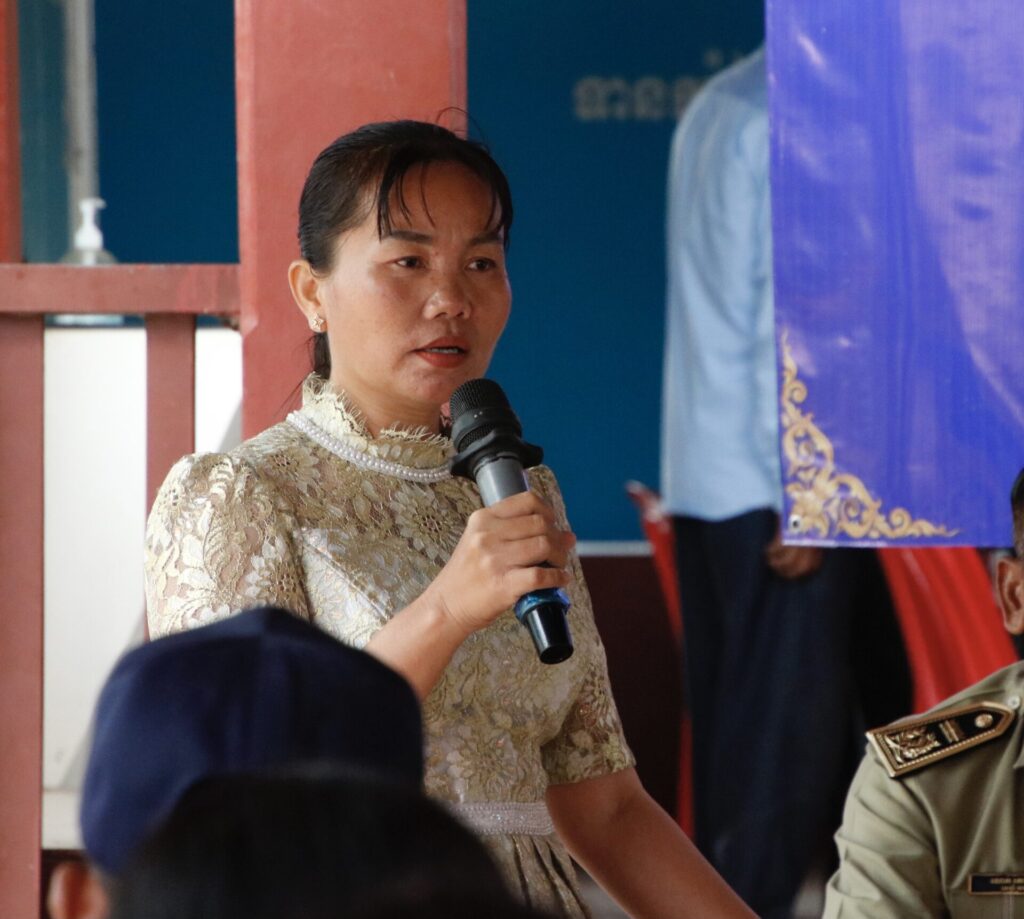 Ms. Phueng Kimhuoy – International Women’s Day Celebration, Banteay Meanchey Province
Ms. Phueng Kimhuoy – International Women’s Day Celebration, Banteay Meanchey Province
Interview by Phun Phearun
Since I have working in this commune (about 7 years ago), I have never seen the commune authorities organize an event like this. I have brought up this idea before, but it never received support. The initiative to organize the March 8th, 2025, event is to raise public awareness of their rights, especially for women to understand their rights more clearly and to avoid misconceptions about what women’s rights are. Even today, some people still think that women’s rights exist for only one day. Therefore, celebrating International Women’s Day here is to emphasize that women’s rights are not just for one day. During this event, we also shared the history of International Women’s Day with the participants, so they would understand the sacrifices and struggles of women around the world, leading to governments recognizing the value of women and enshrining equality between men and women.
In Cambodia, I observe that even when women hold positions equal to men, their voices are often not given the same attention or support as men’s, even if the men’s statements are less precise. Men may only accept a woman’s words if she spends significant time explaining, organizing, managing, and finding resources to make a project work, only then they will agree and support those women. Meanwhile, I am the only woman who dared to repeatedly propose to the commune chief to celebrate International Women’s Day on March 8th, and this is the first time it had been able to take place.
In the past, as a local official, I have visited the women who were facing crises, domestic violence, and financial difficulties, and tried to encourage them, providing positive experiences and motivation to help them overcome their challenges. I had also reported to local authorities and other institutions to seek various kinds of support. Beyond working with women’s groups, I have also mobilized assistance for the community, such as planting trees, building ponds, wells, and promoting natural farming practices/methods to local community.
However, some women face depression due to a lack of support in their family lives, community work, and commune activities. Even when women speak out about violence or financial problems, they are often not heard. Furthermore, despite the existence of women’s groups to address these issues, their voices are still limited in the commune’s decision-making processes.
Therefore, celebrating International Women’s Day this time is very important because participants listened, and it provided an opportunity to raise their issues for public awareness and to seek collective solutions. As a woman, I want to see commune members cooperate, support each other, participate in all commune events, and continue these activities annually. This will provide opportunities for women, youth, and everyone to learn, change mindsets, and critically analyze family and social issues to eliminate injustice against women and jointly develop our commune. I urge authorities at all levels to continue supporting these events and encourage women’s voices to be heard more in communes, communities, and families.
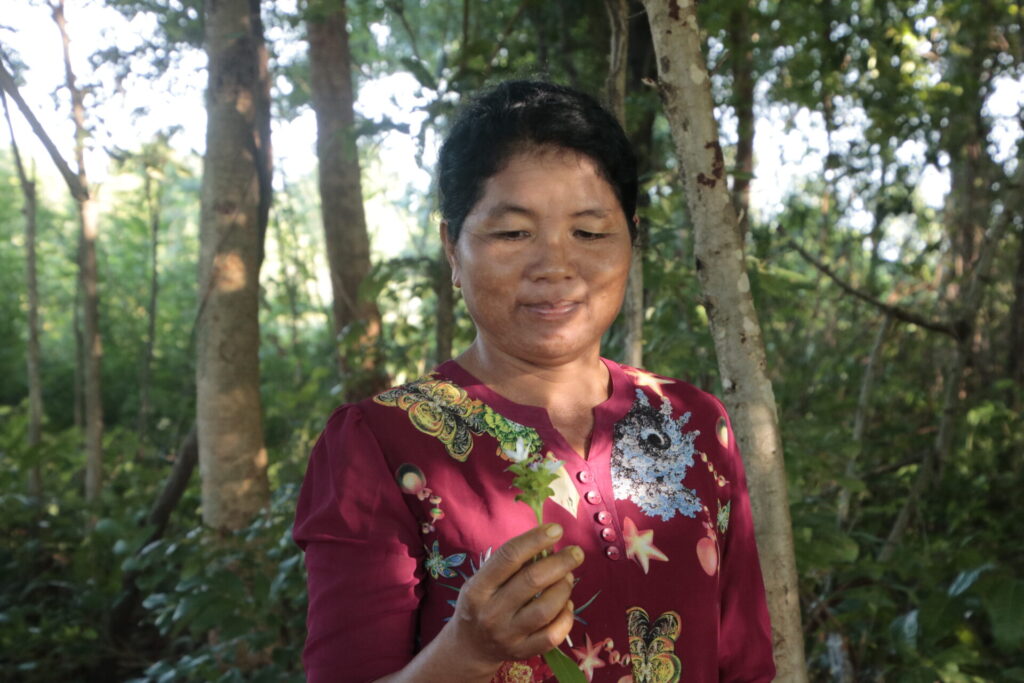 Mrs. Roeun Nak – Oddar Meanchey Province
Mrs. Roeun Nak – Oddar Meanchey Province
Interview by Phun Phearun
In my opinion, within the political arena, women continue to face neglect and a lack of value both family and social settings. They think women lack of political knowledge, create many problems, and preventing their participation in politics, which is a demonstration of gender discrimination. When women raise legal issues, livelihood concerns, agricultural prices, or community problems, they are accused of being affiliated with a political party or the opposition, which suppresses their freedom of expression. She further added: As an ordinary woman, when we speak, they don’t listen; they say we have no role. This behavior is discrimination from the authorities, as they express dissatisfaction with us because we talk about social issues too much. Their actions are hindering women like me, as well as other women, from actively participating in the process of improving society and politics, especially preventing us from expressing our own views and the needs of other women. This is a violation of women’s rights and an obstacle to political change, which the law stipulates that everyone has an equal right and to the law.
Talking about economic situation, the current situation in the community is facing a debt crisis due to low agricultural prices and a lack of markets. In the past, I have consistently helped explain to villagers about natural farming and animal husbandry, and also tried to explain to other farmers about diverse crop cultivation to increase daily income. However, most residents are forced to migrate to Thailand and sell their land without careful consideration to repay their debts. Such decisions further exacerbate their vulnerable livelihoods. At the same time, the authorities have never held meetings to resolve or discuss debt or migration issues with the local residents. Instead, the authorities only call for the residents to attend meetings with private companies to persuade them to buy chemical fertilizers or sell their products, claiming that only their products are effective and yield high results. Importantly, most residents believe them and want to try using their chemical agricultural products even more. This behavior demonstrates a bias towards the company’s interests rather than resolving the residents’ problems, and as a result, it has caused the residents to suffer increasingly severe impacts.
Practically, in our community, some residents have very little trust in the authorities. Because any ordered or principal issued by the authorities in my village lack transparency, reliability, and high accountability. Recently, the village chief announced a free healthcare service promise, stating that any resident with an illness could register, and the village would take them to the provincial town for free check-ups. Upon hearing this, about 90 percent of the villagers registered. As a result, the village chief only selected five people, and they didn’t receive any medication. Another issue is during the land measurement for providing land titles to residents. When the authorities measure the land, they charge 5,000 riel per plot. Specifically, in my sibling’s case, since they didn’t pay the money, when we went to inquire about the land title slip, they said they would look for it, or kept giving us excuses about coming back on certain days. It was only after my mother offered them some money (we also gave them a box of beer) that they found the slip. Conversely, when measuring land for those with power, they issue the slip without requiring payment. In short, the irregularities in land measurement and title issuance demonstrate discrimination and corruption, which make it even more difficult for women and residents who need public services. There was also a case where a land title slip had been issued, but when the owner wanted to sell the land, the authorities said it was impossible because the documents had already been sent senior manager or sub-national official. However, later, the authorities said it could be sold, but both the buyer and the seller had to pay money.
Finally, as a woman living in a rural area, to address these issues, I urge the Royal Government to implement Article 46, paragraph 3 of the Constitution, which states: ‘The State and society shall pay special attention to creating conditions for women, especially those in rural areas without support, to receive assistance to have occupations, access medical treatment, send their children to school, and have a decent standard of living.’ Furthermore, state and non-governmental organizations should provide education on economics, politics, and law to women to strengthen their capacity and participation. Regular gatherings and discussions will provide opportunities for women to raise issues and seek joint solutions for society as a whole. Additionally, as citizens, we must all submit requests to national or sub-national levels to find solutions for citizens regarding agricultural products lacking markets, to find markets for farmers, or to request the cessation of agricultural imports from neighboring countries for products that our country can produce by farmers.


